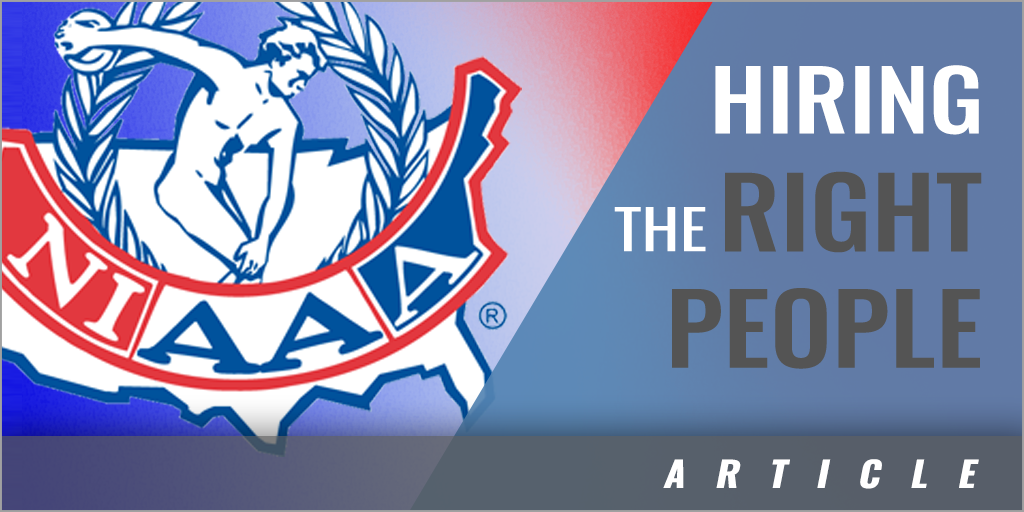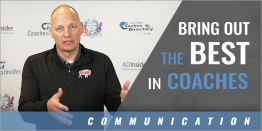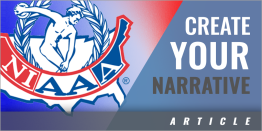|
By: Scott Paine, MBA, CMAA, CIC One of the most important skills you can develop as a leader is selecting, developing, and empowering the right people. The potential of your department and/or organization rests on the strengths of its people. You can have the best product, best strategy, or best vision, but without the best people, your department will always be limited! Jim Collins said it this way: "People are not your most important asset. The right people are." Let me restate, you can have the best mission, the best strategy, and the best vision, but without the best people, your department will always be limited! The following sections will give you practical help when selecting the best candidates when you're making any type of hire. Begin with the end in mind This one sounds simple, but many leaders overlook it. When you're writing a job description, be clear about what type of person you want. Don't just list duties - list characteristics the person needs to have. A general idea of what you want won't help you fill a specific role. Hire for the future, not the present. Be ruthlessly selective The best time to fire is before you hire. Making no hire is better than making a bad hire. The cost of hiring a bad team member is greater than the cost of missing a good one. Wrong hires early make it more difficult to make great hires later. In my department, we believe in the mission of what we do, so we won't settle for anything but the best people that fit that mission! Never hire someone out of desperation and be careful when you find yourself talking yourself into hiring a candidate. When you're exhausted and you're just looking for help, you're vulnerable to making a bad hire out of convenience. I know that many times we find ourselves with only one applicant for a job. We see this as the only option but again a bad hire or a band aid will only turn into another band aid. When you see something that concerns you about a candidate, don't try to make excuses for them, dig in! If the right person isn't there, it's time to think outside the box in terms of finding an alternative solution, and unfortunately that single applicant you have is not your right person. Develop an intentional system or plan When you know what you want, decide how you will determine a fit. My interview questions all fall under four main categories: skill, value, behavior, and character. A majority only focus on skill and character. The best predictor of future success is past success. You can learn a lot from the past. If you find someone who is crazy talented but has vastly different values or behaviors, they're not a great fit! Make sure you ask questions geared toward your department's core values, and don't be afraid to put candidates in real-life situations to test them. If they don't have the skills yet, but they fit your values, go all-in! "Hire passionate people. You can train skills, but you can't train passion," (Craig Groeschel). Define your core values What do you stand for? What you value determines what you do. What you value determines how your team will behave. Values create culture - before you add to your team, be clear on what you value. List your top behavioral values. This isn't what we believe, it's how we behave. Look at the top five performers in your organization, or define the behaviors you are looking for: How do they work? What practical qualities do they have? Are they driven? Creative? Fun? Passionate? Flexible? Focused? In my department we have the following four core values: growth-mindset, accountability, integrity, and passion. Our four core values set the foundation for how we develop a culture of greatness. To build a winning team and a successful organization you must create a culture of greatness. It's the most important thing a leader can do because culture drives behavior, behavior drives habits, and habits create the future (Gordon). As the leaders at Apple say, "Culture beats strategy all day long." When you create a culture of greatness you create a collective mindset in your organization that expects great things to happen - even during challenging times. You expect your people to be their best, you make it a priority to coach them to be their best, and most of all you create a work environment that fuels them to be their best. This is why we must be thoroughly selective when hiring new members to our team because culture wins! Prepare for the interview with behavioral-based interview questions Ask questions that cause the candidate to reply based on how they have performed in the past. It is a good indicator of how they will perform in the future. Avoid situational questions that ask the candidate, "What would you do if…?" That is hard to know without actually experiencing the situation and/or they have been asked these loaded questions before and are able to give you the cliche answer. Thus leaving you with no depth or insight to the candidate at all. However, asking the candidate how they managed a situation in the past should provide valuable insight. Behavioral interview questions start with phrases such as "Tell me about a time when you..." or "Describe an experience you have had with…" and "How did you manage…?" Train yourself and those who are on the interview committee on how to properly conduct a behavior-based interview (Turner). It will yield better results and also help you avoid legal difficulties in the hiring process. One of the practices that I have myself and those on my interview committees do is to go three questions deep. In other words, when the candidate answers the question, ask a follow-up question to the answer and then another follow-up question (Turner). Yes this adds time to the interview, but the most valuable information about the candidate is usually found in the answer to the third question. The exchange might look something like this: "Tell me about a time when you were recognized for superior performance." The candidate responds with an example. My next question might be, "Who helped you achieve that goal?" They, in turn, talk about the leader or team who was part of the achievement. My next question is, "How would that person or team describe your contribution?" My staff and I try to "pull the loose threads." If they heard an answer that seemed incomplete or maybe even seemed like a false answer, then ask questions until it's resolved. If they saw something on the application, like a long gap in employment, "pull the loose thread" and put the whole picture of the candidate together (Turner). Once you hire; train, release, and learn Onboarding newly hired staff is absolutely critical. I use a process called "Training Camp." New staff are given books to read, expectations, and resources to become successful in our department culture and teams. Once hired we use a task flow sheet that allows each department member and the new hire what needs to be completed and by when. We show them how to set goals, stay accountable, look at performance metrics, and stay healthy. We give them slightly more responsibility than they expect, but considerably more feedback than they expect. Regular feedback helps improvement. Now, this can be a very overwhelming time, but the time shortly after you hire someone is incredibly valuable. They have a fresh perspective. After 90 days, they are likely to start blending in and asking fewer questions (Groeschel). Early in their time on your team, ask intentional questions like "What surprised you?" or "What could we do to improve?" "You never accidentally stumble into a great team. You intentionally build one," (Groeschel). Surrounding ourselves with talented people whose character matches our own, whose competency matches our needs, and whose chemistry matches our team not only sets us up to win but makes the endeavor much more enjoyable. Excellence attracts excellence. When selecting talent, focus on the three Cs: character, chemistry, and competency – in that order. Remember, you don't have to know it all to be a great leader! Be a leader who is authentic and real! Now go be excellent! Always remember, "When the time to perform has arrived, the time to prepare has passed." This article was synthesized by personal thoughts and directly referenced from the following sources: Gordon, J. (2017). The Power of Positive Leadership: How and Why Positive Leaders Transform Teams and Organizations and Change the World (1st ed.). Wiley. Groeschel, Craig. "Principles of Higher Hiring, Part 1." Craig Groeschel Leadership Podcast, Life.Church, https://www.life.church/leadershippodcast/principles-of-higher-hiring-part-1/ Turner, D. (2019, October 25). 6 Must-Do Steps to Hire the Best Talent. Global Leadership Network. https://globalleadership.org/articles/leading-organizations/6-must-do-steps-to-hire-the-best-talent/ |







